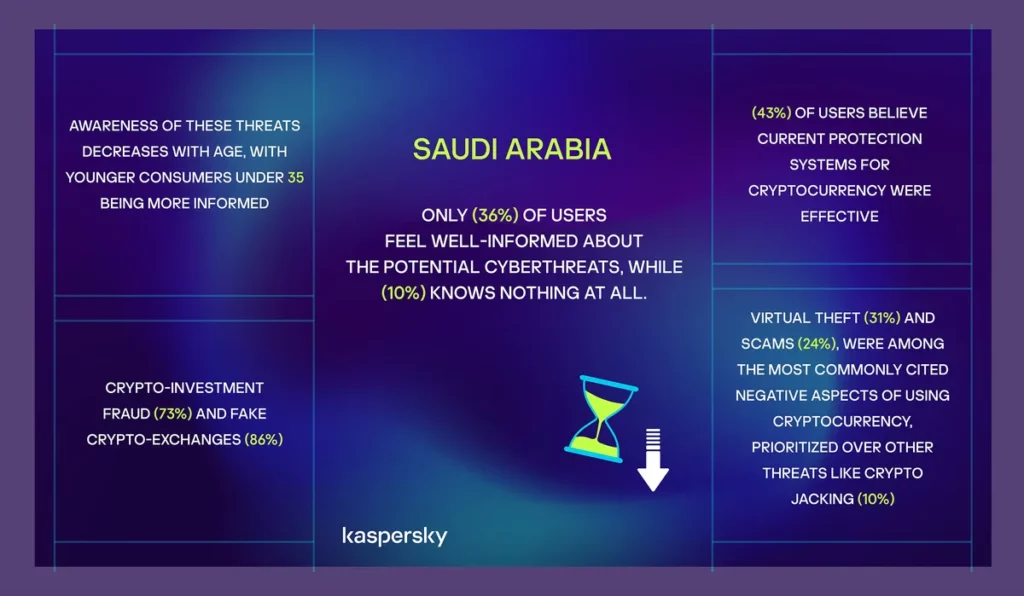
Kaspersky survey: 74% of users hit by crypto cybercrime, while only 25% are fairly aware of crypto risks in Saudi Arabia
Kaspersky has explored cryptocurrency user trends, finding that just 36% of respondents felt well informed about potential cryptocurrency cyberthreats, while 10% had no information at all. In a survey, Kaspersky also discovered that half of the respondents had been affected by cryptocurrency crime in some way, with 57% of crypto owners did not believe current protection systems for cryptocurrency were effective. These and other findings are in Kaspersky’s new report.
Are users familiar with cryptocurrency threats?
According to the recent survey*, a significant proportion of individuals are unaware of the potential threats faced by cryptocurrency owners. Despite the increasing popularity of cryptocurrency, only 36%[AO1] of respondents felt extremely or very well informed about the potential risks of using it, while 10%[AO2] had no information at all. Moreover, awareness of these threats decreases with age, with younger consumers under 35 being more informed.
Cyber threats, such as virtual theft and scams, were among the most commonly cited negative aspects of using cryptocurrency, with31%[AO3] and 24%[AO4] of respondents in Saudi respectively highlighting them as their top concerns. [ru5] While 32%[AO6] of respondents were unaware they could become a target of crypto threats – even if they do not own cryptocurrency. It is worth noting that anyone can become a target for cryptominers – programs that secretly generate cryptocurrency for their owners using the resources of other computers, whether they own cryptocurrency or not.

Threats concerns vary by region
The major concerns in Saudi Arabia and the United Arab Emirates are crypto-investment fraud (73%and 70%, respectively), and fake crypto-exchanges (86%) in Saudi Arabia, as well as fake crypto-currency apps in the UAE at (71%).[AO8]
Does cryptocurrency need more protection?
More than half (74%) of all respondents had been affected by cryptocurrency crime in some way, revealing the wide range of criminal activities in the field. Additionally, 57%[AO9] of surveyed individuals did not believe that current protection systems for cryptocurrency were effective, with 33%[AO10] of current crypto owners in Saudi Arabia not believing existing protection systems to be sufficient.
“Despite the recent cryptocurrency market downturn, the level of malicious activity in the field has not decreased. The crypto industry, still in its infancy, remains a prime target for fraudsters. This survey emphasizes the need for increased awareness and education about the potential risks faced by cryptocurrency owners. As the adoption of digital assets continues to grow, it is essential for individuals to take appropriate measures to protect themselves from cyber threats,” comments Vitaly Kamluk, the head of APAC unit, Kaspersky’s Global Research & Analysis Team.
Read the full report on Kaspersky Blog.
To maximize the benefits of using cryptocurrency safely, Kaspersky experts also recommend:
- Use strong and unique passwords: creating strong and unique passwords for each of your crypto accounts can help prevent password cracking and brute force attacks.
- Avoid phishing attacks: phishing attacks are attempts to trick you into revealing your login credentials or personal information. Be wary of suspicious emails or links, and always double-check the URL before entering your login information.
- Don’t share your private keys: your private keys unlock your cryptocurrency wallet. Keep them private and never share them with anyone.
- Educate yourself: stay informed about the latest cyber threats and best practices to keep your cryptocurrency safe. The more you know about protecting yourself, the better equipped you’ll be to prevent cyber-attacks.
- Use security solutions: a reliable security solution will protect your devices from various types of threats. Kaspersky’s portfolioprevents all known and unknown cryptocurrency fraud, as well as unauthorized use of your computer’s processing power to mine cryptocurrency.
* Kaspersky commissioned Arlington Research to undertake quantitative global online research with 12,000 people from 16 countries: Austria, Brazil, Colombia, France, Germany, India, Malaysia, Mexico, Saudi Arabia, South Africa, Spain, Switzerland, Turkey, UAE, the UK, and the USA.
[AO1]24% in S.Africa
36% in Saudi Arabia
41% in Turkiye
33% in the UAE
[AO2]18% in S.Africa
10% in Saudi
9% in Turkiye
11% in the UAE
[AO3]31% in South Africa
31% in Saudi
25% in Turkiye
34% in the UAE
[AO4]38% in S.Africa
24% in Saudi
26% in Turkiye
24% in the UAE
[ru5]Q11
[AO6]49% in South Africa
32% in Saudi
23% in Turkiye
36% in the UAE
[AM7]To be changed and sent separately for approval
[AO8]Please amend the text according to local figures
[AO9]Mentioned above
[AO10]South Africa: 42%
Saudi: 33%
Turkiye: 39%
UAE: 41%











































